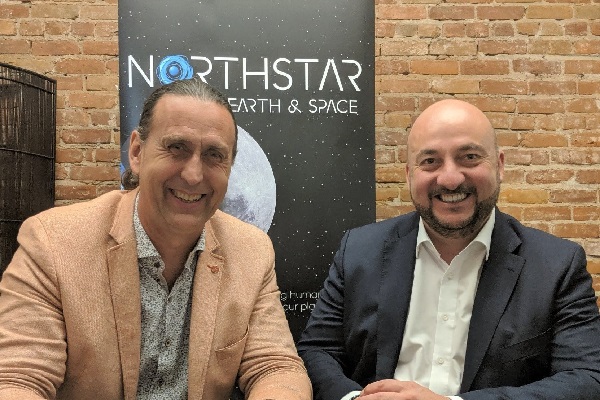 L-R: Stewart Bain, CEO of NorthStar Earth & Space; Étienne Schneider, Deputy Prime Minister, Minister of the Economy;
Credit: MECO
L-R: Stewart Bain, CEO of NorthStar Earth & Space; Étienne Schneider, Deputy Prime Minister, Minister of the Economy;
Credit: MECO
Luxembourg will be working with NorthStar Earth & Space on the development of a "Clean Space" initiative to foster sustainability in space.
During the visit of Luxembourg's Deputy Prime Minister and Minister of the Economy Étienne Schneider to the NorthStar Earth & Space headquarters in Montreal, Canada, the two parties launched a partnership to enable a Clean Space initiative aimed at promoting sustainability in space.
The Clean Space initiative would evaluate the use of NorthStar Earth & Space Information services with the support of Luxembourg's insurance, financial and satellite operator communities to address some of the key issues related to space traffic management, sustainable commercialisation of space activities, insurance products for space operations to promote growth in commercial space activities and satellite operational challenges.
Stewart Bain, CEO of NorthStar Earth & Space, a Canadian tech company developing the world's first comprehensive Earth and space information platform, commented: "NorthStar and its international partners are pleased to collaborate with Luxembourg to enable the sustainability of our environment in space with the global Clean Space initiative. Luxembourg is uniquely positioned to provide value-added services within the insurance and financial industry and home to many satellite companies who will benefit from this project".
Étienne Schneider added: "The proposed cooperation with NorthStar is in line with Luxembourg's efforts in developing high-fidelity space situational awareness to protect the space environment beyond our planet and in promoting earth observation to better understand the complexity of our planet and monitor its health".
NorthStar's mission is to empower humanity to preserve Planet Earth by putting into place a unique Space and Earth information platform dedicated to space-based Space Situational Awareness (SSA) and Earth Intelligence. Starting in 2021 and based on a satellite constellation equipped with Hyperspectral, Infrared and Optical sensors, the platform will operate continuously from space, imaging, digitising and analysing the details of Earth's ecosystems and surrounding orbit on a daily basis. It aims to transform the way governments, industry and NGOs assess risk, enforce regulations and make decisions to foster the sustainable development of the planet and deliver a safe and secure near-space environment for the global satellite community.
For its part, Luxembourg has been at the forefront of commercial and co-operative space initiatives for more than three decades. Its first foray into space came in 1985, with the creation of the Société européenne des satellites (SES). Today, the space sector's contribution to national GDP is among the highest in Europe.








